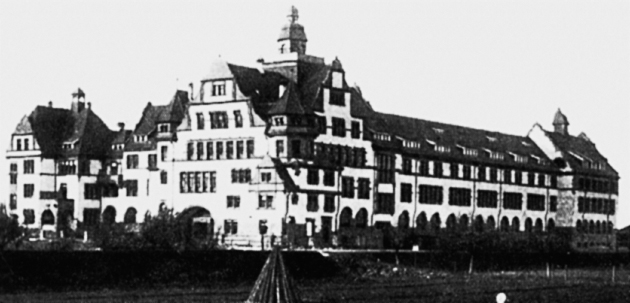Bildungswissenschaften und akademisches Selbstverständnis in einer globalisierten Welt- Education and Academic Self-Concept in the Globalized World
Summary
This volume presents a series of contributions from the XIX. International Scientific Conference on The Reform of Education and Teacher’s Training on the topic Educational Sciences in Search of Global Identity which was conceived and organized by the Ministry of Education and Science of the Republic of Lithuania, Lithuanian University of Educational Sciences and Heidelberg University of Education (Germany). Main topics of the conference were educational quality standards of Higher and Secondary Education. This kind of quality management relies on the acquisition of interactive competence in socialization and the educational sector. The development of these basic skills is prerequisite for achieving an identity in order to meet the challenges of our society in the coming decade.
Excerpt
Table Of Contents
- Cover
- Titel
- Copyright
- Autorenangaben
- Über das Buch
- Zitierfähigkeit des eBooks
- Inhalt
- Welcoming Speech
- Vorwort
- Educational Science in Search of a Global Identity: an Introduction
- The Globalizing World and Man’s Education. Reflecting on Meile Lukšiene’s Insights – an introduction from Lithuanian perspective
- Is it Possible to Create a Global Identity of Educational Science?
- About nationality in the globalized world
- Globalization and Education: Future Perspectives
- Towards global identities: internationalization of teacher training at the Heidelberg University of Education
- Drawing a conclusion from Globalisation means rethinking our teaching and assessing our practice
- Lebensglück (ευτυχία στη ζωή) als Bildungsziel – als Katalysator für Identitätsfindung
- Über das Unvermögen der Sozialwissenschaften den Menschen zu bestimmen
- Self-Education as Premise and Context for Teacher’s Identity Development: The Case of Master Studies in Educational Science
- Education for Sustainable Development in Teacher Training in Baden-Württemberg: From Theory to Implementation
- Die subjektive Bedeutung von Schule und formaler Bildung aus der Perspektive von Schülerinnen und Schülern. Eine empirische Untersuchung an Brennpunktschulen
- Improvisational Theatre in the Secondary EFL Classroom: Teacher-Researcher Collaboration as In-Service Teacher-Training
- War and Peace in Historical Education of Modern Lithuania
- Gewaltlos glücklich
- Mathematische Bildung auf der Fährte der Reproduzierbarkeit
- The Pre-Service Social Pedagogues’-First Year Students’-Vision of Quality Studies
- The Controversy of National Education: Towards Depth or Shallowness?
- (Re)conceptionalisation of Curriculum in Contemporary Educational Discourse: International and Lithuanian Perspectives
- Identitätsentwicklung bei Schwächen in der Wahrnehmungsorganisation. Aufwachsen unter erschwerten Bedingungen mit besonderer Berücksichtigung der Affektregulations- und Bindungstheorie
- Personal Competence in the Structure of Model of Mentor Competences and its Expression
- Professional Identity Characteristics of a Teacher Implementing Inclusive Education: Pupil and Teacher Experience
- The Creative Originality and Technological Inclinations of female Trainee Teachers of Technologies
- Technological Education as a Platform for Developing Global and National Identity
- Being Oneself: Changes in the Lithuanian Prospective Teachers’ National Identity Building
- The Challenges of Globalization for the National Identity of Trainee Teachers
- Peculiarities of Learning and Teaching History to 8th – Formers on the Basis of Gender Distinctions
- Human beliefs, values and social – education analysis; of the philosophy, of theology and psychology pisture
- The Present-Day School and Teacher’s Professionalism: the Parents’ Evaluation
- The Development of College Teachers’ Intercultural Competences and their Application in Educational Activity
- The Ethnic Identity and Future Plans of the Multinational Student Community
- Student Support Needs in Individual Work Tasks: Student-Centred Approach
- Innovation and its Modeling in Educational Environment
- Identity and Inequality: Artistic Activity as the Precondition for Social Integration
- The Experiences of Students of Fine Arts Education During the First Period of Teacher Practice
- Cultural Competence as Keystone of Training Teachers of Foreign Languages
- The Peculiarities of Applying Information Communication Technologies in the Process of Musical Education
- Positive Experience in Teaching Practice of Pre-Service Teachers of Music: Analysis of Written Reflections
- The Characteristics of Developing the Communicative Competence of Primary School Children
- The Vision of Pre-Service Music Teachers’ Personal Career
- Social Aspects of Gender Representation in Efl Textbooks
- Bildungswissenschaftliche Aspekte Bei Der Motivationssteigerung Der Litauischen Hochleistungssportler Im Kontext Der Spe Zifischen Nationalidentitätsmerkmale
- Sprache und Kultur im Wandel. Zu Transformationstendenzen der litauischen Grundwerte und Identität
- Vergleichende Untersuchung der Redeetikette als Materialquelle für die Heranbildung der primären linguakulturellen Kompetenz (am Beispiel der russischen, litauischen und türkischen Abschiedsausdrücke)
- Autoren
← 14 | 15 → Welcoming Speech

A long period of cooperation, collegiality and student exchange unites the Lithuanian University of Educational Sciences (LEU) and the Heidelberg University of Education (PH HD). Our universities have achieved a remarkable level of steady international partnership to promote student exchange, academic cooperation, joint academic discussion, research and publication in order to mutually benefit from each other.
To look back on this engagement is very rewarding, but as our universities renewed their agreement of cooperation in 2013 our sight and will is as well adjusted to the future. From our side the academic partnership between LEU in Vilnius is the most intensive and constantly kept alive. Beside personal and institutional engagement it is owed to the facilitated conditions within bilateral state treaties, the German Academic Exchange Service DAAD, the Erasmus programme and European funding for academic exchange. But we can’t neglect to face a decline of outgoing students in general. We have to concern ourselves with this issue.
It is an honour and a pleasure for me to give the foreword to the proceedings of the conference “Educational Science in the Search of Global Identity” 2013 in Vilnius. The topic was search for identity as educational researchers and teacher trainers inside a framework of globalization. I take the liberty to give some personal summary from presentations and personal communication on the conference.
Lithuania is undergoing a transition of a tremendous scale which is partly seen as an identity crisis. The membership of Lithuania in the EU is not only seen as a chance to preserve national identity but as an adaption to externally imposed standards, such as Bologna requirements. To some colleagues this transition process is even perceived as a threatening phenomenon, for example the individual being assigned to a degraded role of a consumer. We Germans tend to be reluctant when it comes to the question of national identity – for historical reasons. From different contributions we learned that national identity is valued very high in pedagogical thinking in Lithuania. This could be an impetus for us ← 15 | 16 → Germans to re-reflect on this issue for ourselves in a more and more transcultural and globalized context.
Finally I want to draw the attention to an issue which to me personally is very remarkable, outlining the importance and the role of Lithuania within the European Union. At the very moment of the conference in the second half of the year 2013 the Republic of Lithuania presided the Consilium, i.e. the Council of the European Union and took major responsability within the EU. Europe looked and listened towards Lithuania. In May 2013 the President of the Republic of Lithuania, Dalia Grybauskaitė was awarded the International Charlemagne Price of the City of Aachen. Aachen was the major palace of emperor Carolus Magnus and the temporary capital of the Franconian Empire after the decline of the West Roman Empire. The high-ranking Charlemagne Price distinction is only reserved to laureates who contribute in an outstanding way to the integration of the European nations.
For us Germans your President’s speech is worth reading. Perhaps we Germans are tending to take Europe as a given thing and a matter of course. President Dalia Grybauskaitė rather gave a striking and awful insight that the Lithuanian people had to fight for their right of independence, freedom and a future of their own. And that the Lithuanian people had to go through tough periods of austerity and financial discipline. I take the liberty to quote Dalia Grybauskaitė from her very remarkable speech at this occasion.
“Dear Europeans,
the world has already recognized the role of Europe in advancing peace, reconciliation, democracy, and human rights. We must take the responsibility to transform these values that we all share into a vision of tomorrow and a daily reality for our neighbours and partners. It is responsibility by example which is expected from us. We Europeans are a role model of learning, listening in, negotiating, and finding solutions together.”
What we can contribute by our cooperation and by the 2013 conference is only kind of a small but visible part of “responsibility by example”. Our cooperation is just a brick to the further erection of the European house. But every brick counts and contributes to the stability of the whole construction. So let us take it very seriously.
Heidelberg in May 2014
Bernward Lange
Vice-Rector for Research and International Relations
Heidelberg University of Education
← 16 | 17 → Vorwort
Die im Oktober 2013 an der Litauischen Universität für Bildungswissenschaften (Lithuanian University of Educational Sciences/Lietuvos edukologijos universitetas) in Vilnius stattgefundene zweitägige XIX. Internationale wissenschaftliche Konferenz (19th International Scientific Conference/XIX-oji Tarptautinė mokslinė konferencija) widmete sich der Themenstellung Bildungswissenschaft auf der Suche nach globaler Identität (Educational Sciences in Search of Global Identity), daher auch die Anlehnung des Titels dieses Bandes 28 der Reihe „Baltische Studien zur Erziehungs- und Sozialwissenschaft“ an die Konferenzthematik, da die meisten Beiträge dieser Tagung gewidmet sind. Veranstaltet wurde selbige insbesondere vom Bildungswissenschaftlichen Institut (Department of Educational Sciences) der Bildungswissenschaftlichen Fakultät (Faculty of Educational Sciences/Ugdymo mokslµ fakultetas). Gemeinsamer Partner dieser Konferenz war 2013 die Pädagogische Hochschule Heidelberg – Heidelberg University of Education).
Alle jährlich stattfindenden Tagungen stehen unter der Prämisse Bildungsreform und Lehrerbildung (The Reform of Education and Teacher’s Training/ Švietimo reforma ir mokytojų rengimas), ein Diskurs, der vom Ministerium für Bildung und Wissenschaft der Republik Litauen, der Litauischen Universität für Bildungswissenschaften (LEU) und der Pädagogischen Hochschule Heidelberg (Heidelberg University of Education) gemeinsam seit 2005 konzipiert wird. Fokus ist die stringentere Einbindung der pädagogischen Praxis (Trias: Handlungstheorie, -forschung, und -praxis), d.h. Bildsamkeit und Erziehbarkeit werden reflektiert unter der Prämisse einer ‚reflexiv-modernen‘ Bildungswissenschaft, will sagen: wie gestaltet sich eine inklusive, d.h. handlungsorientierte kooperative Schulbildung, im Hinblick auf die Herausforderungen des kommenden Jahrzehnts. Zu dieser Thematik diskutierten in Vilnius Wissenschaftler, Mitglieder (inter-)nationaler Bildungsorganisationen/-institutionen und praktizierende Pädagogen/ Philologen. Behandelt wurden aktuell anstehende Fragen, wie beispielsweise die vorangehende (Nach-)Reformierung des Studiums und die Qualitätsentwicklung (Festsetzung von Bildungsstandards im Hinblick auf eine Neuorientierung sowie Umstrukturierung hinsichtlich der Anforderungen internationaler Qualifikationen in Universität und Schule.
Die Entwicklungsstrategie der Litauischen Universität für Bildungswissenschaften bis zum Jahre 2014 sieht als ‚Vision‘ eine Vertiefung der wissenschaftlichen ← 17 | 18 → Kompetenzen, die den internationalen Bildungs- und Qualitätsstandards entsprechen, vor, geplant ist die Gründung eines (Landes-)Instituts zur Weiterentwicklung und Normierung von Bildungsstandards nach dem Vorbild des IQB (Institut zur Qualitätsentwicklung im Bildungswesen an der Humboldt-Univer-sität zu Berlin). Dieses Qualitätsmanagement setzt somit den Erwerb interaktiver Kompetenzen im Bildungs-, Erziehungs-, Enkulturations- und Sozialisationsbereich voraus, die eine Befähigung zum Identitätserwerb ermöglichen sollen.
Dies impliziert primär einen Perspektivenwechsel im Bildungs- und Kulturbereich und eine Hinführung zur handlungsorientierten ‚reflexiv-modernen‘ Bildungswissenschaft, die Katalysatorfunktion für den sozialen Kompetenzerwerb zeitigt und somit den Internalisierungsprozess zum Erwerb von Identität in Gang setzen kann.
Qualität von Bildung und Erwerb von nationaler sowie globaler Identität hängt primär von der Professionalisierung der Pädagogen/innen ab, von ihrer Befähigung, nicht nur fachliche Kompetenzen zu vermitteln, sondern auch kulturelle Werte und Normen, die der damit implizierten Persönlichkeitsbildung und somit evozierten Identitätsfindung dienen, der Soziabilisierung des Bürgers/der Bürgerin in einem modernen demokratischen Staatsgefüge.
Abb. 1: Saulius Ikamas: Vilnenser Türme (1992). Lithographie, Archiv: von Carlsburg
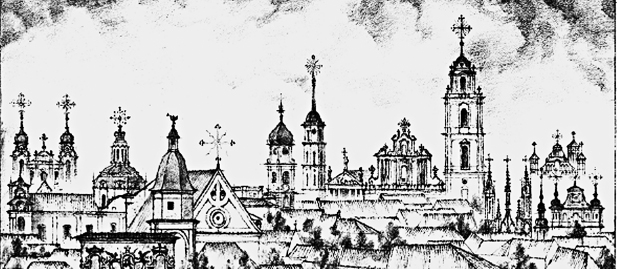
Folgende Wokshops (working groups) verdienen unter dem breiten Angebot von Vorträgen, Arbeitsgruppen… Erwähnung im Hinblick auf die Thematik dieses Bandes:
- Development of global identity.
- National identity in the context of globalization: threats and perspectives.
- Problems and opportunities of national identity promotion in the process of education.
- ← 18 | 19 → Prerequisites of national identity education (spread, guidelines, contours, trends) in the process of pedagogue training.
- New challenges of identity to Lithuanian education.
Abb. 2: Ansicht von Vilnius (Wilna). Stahlstich (19. Jahrhundert). Archiv: von Carlsburg
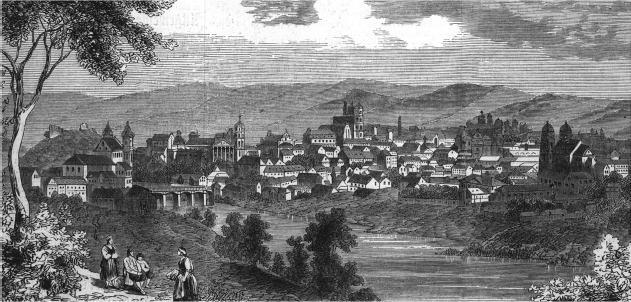
Der Erziehungserfolg hängt zum großen Teil vom Engagement und Berufsethos der Pädagogen/-innen als auch von den Erfahrungen im Umgang mit Kindern, Jugendlichen und der Gesellschaft ab, wie TIMSS (Third International Mathematics and Science Study), PISA (Programme for International Student Assessment) und PIRLS/IGLU (Progress in International Reading Literacy Study/ Internatio-nale Grundschul-Lese-Untersuchung) eindeutig bestätigen. Auch Litauen hat die Ergebnisse verbessert.
Die Konferenzproblematik lässt sich somit auch auf folgende Schwerpunkte erweitern:
- Faktoren, die die Bildungsqualität beeinflussen;
- Probleme der Soziabilisierung;
- Qualifizierung und Kompetenzen der Hochschullehrer;
- Studieninhalte und -qualität;
- Erziehungstheorie und -praxis im Hinblick auf Inklusion und Identität;
- Zusammenwirken für eine zukünftige Bildungsplanung, die globale Identität als Bildungsziel projektiert.
Ein letzter, aber für Litauen prägender Exkurs dieser Tagung, der auch in den litauischen Beiträgen dieses Bandes diskursiven Widerhall findet, so insbesondere in dem Beitrag von A. Gaižutis, galt der litauischen Bildungs- und Literaturwissenschaftlerin, der Philologin sowie Philosophin Meilutė Julija Lukšienė- Matjošaitytė ← 19 | 20 → (geb. 1913 in Wien, gest. 2009 in Vilnius), die international eine hohe Reputation genoss: Dozentin, spätere Direktorin für Litauische Literatur an Universität Vilnius, letztlich Professorin an der Vytautas-Magnus-Universität in Kaunas. Einer ihrer Forschungsschwerpunkte beschäftigte sich mit dem Nachspüren und der Dissemination des Comenianischen Gedankenguts. Jan Amos Comenius (1592-1670), der theologische Pädagoge, Architekt eines neuzeitlichen christlich orientierten Schulsystems, Philosoph, Humanist, Enzyklopädist, Pansophist, der Visionär mit einer tiefen Sehnsucht nach Frieden, lebte in einer historischen Zeit gravierender gesellschaftlicher Umbrüche. Die traumatisierenden Erfahrungen des Dreißigjährigen Krieges schärften seine Imaginationskraft, die auch heute vielfältige Anregungen intendiert: ein Europa, Diversivität und Heterogenität, Frieden schaffen ohne Waffen. Sein nach Pantheismus suchender Geist – einerseits Gott und andererseits die Ratio als Orientierung, das ständige Abwägen, eins mit dem Makrokosmus, der Natur – bildet die Urkraft für menschliche Liebe und Erziehung zu derselben (Bindungspädagogik). J.A. Comenius firmiert für eine Neuordnung der Welt durch Aufklärung.
Abb. 3: Hauptgebäude (Rektorat) der Litauischen Universität für Bildungswissenschaften – Lietuvos edukologijos universitetas (LEU)
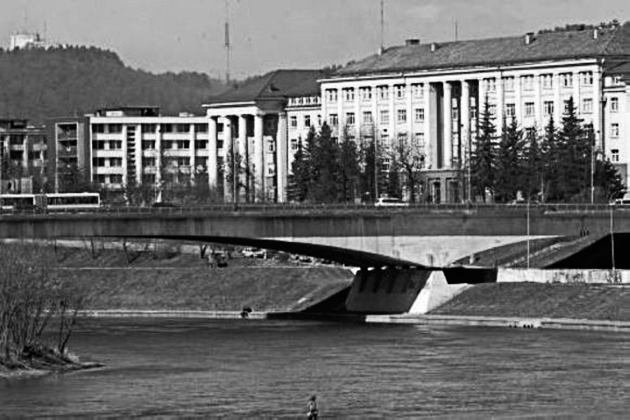
Auch Meilė Lukšienė sah das Comenianische Denken, Comenius, Auseinandersetzung mit René Descartes (1596-1650) – z.B. Les passions de l,âme, 1649 –, als Basis für Bildung und Lebenssinn: schon den Kindern von klein auf die Möglichkeit zu geben, ← 20 | 21 → sich selbst die Welt als Gottes Schöpfung und Ertrag seiner Weisheit, als Mikrokosmos im Makrokosmos, essentiell zu erschließen. Dafür erhielt sie 2004 die Jan-Amos-Comenius-Medaille der UNESCO. Die Reformierung der Lehrerbildung war ein weiteres Anliegen dieser engagierten Humanistin. Reform durch Evolution ist nicht nur in mittel- und osteuropäischen Ländern, sondern auch in Deutschland ein aktuelles Thema, hält man im Bundesland Baden-Württemberg mit seiner Grün-Roten-Landesregierung an der einzig in Europa bestehenden und nicht mehr zeitgemäßen, rückwärtsgewandten zweiteiligen Lehrerausbildung fest. Hinzu kommt eine zweiphasige Lehrerausbildung, zusammen mit Österreich eine europäische Spezies, die auch durch die angedachte School of Education keine Fortschritte bringen wird.
Abb. 4: Matthäus Merian d.Ä. – Das ChurFürstliche Pfältzische Schloß und Gartten, Zu Haydelberg. (V)on Mitternacht an zusehen (Theatrum Europaeum ca. 1643/45). Archiv: v. Carlsburg
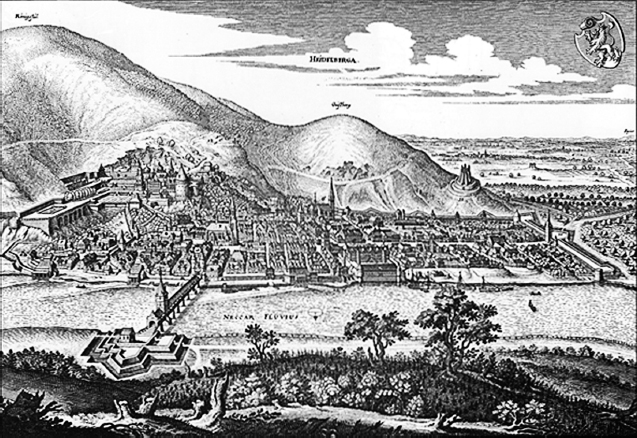
In der Konferenz wurden u.a. Forschungsergebnisse vorgestellt, die verschiedene Lehr-/Lernetappen sowie soziologische als auch sozial-psychologische Kompetenzen tangieren. Die Auswahl der Beiträge in diesem Band kann nur einen Überblick vermitteln und motivieren, an der jährlich stattfindenden Internationalen Konferenz selbst aktiv teilzunehmen, um im Denken/Handeln aus globaler ← 21 | 22 → Sichtweise den politischen und erziehungswissenschaftlich-kulturellen Paradig menwechsel zu erörtern.
Abb. 5: Heidelberg um 1620, Kupferstich von Matthäus Merian d.Ä. Archiv: v. Carlsburg
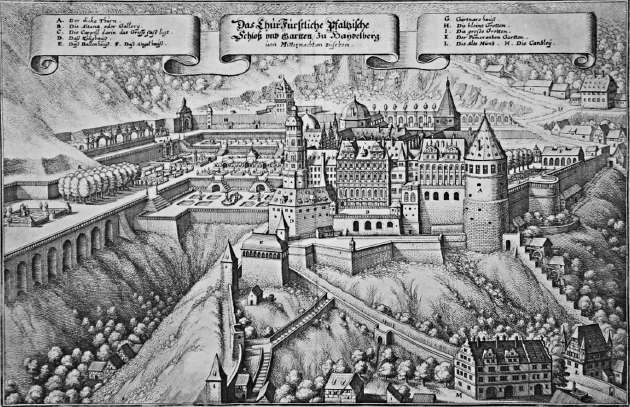
Seit Mai 1994 besteht ein Austausch in der Lehrerbildung zwischen Heidelberg und Vilnius, wobei am 6. Oktober 1995 in Vilnius ein Kooperationsvertrag mit der Pädagogischen Universität Vilnius geschlossen wurde. Der Vertrag regelt den Austausch von Dozenten/innen und Studenten/innen und beinhaltet die gegenseitige Anerkennung von Studienleistungen bis hin zum Promotionsstudium. Durch den interkulturellen Transfer auf der Mikroebene sind Menschen in privater und dienstlicher Sphäre zusammengeführt worden; sehr wertvolle Freundschaften haben sich gebildet, die weiter vertieft wurden bzw. werden sollen. Somit entwickelte sich die Kooperation mit Heidelberg für litauische Lehrende und die Studierende zu einem sehr begehrten Studienort. Umgekehrt waren insbesondere die Praktika an den litauischen Schulen bei den Heidelberger Studierenden sehr begehrt; hier war die Nachfrage größer als das litauische Angebot.
Die XVII. Internationale Tagung wurde vorbereitet durch folgende Komitees:
Präsidium/Conference chairs and Deputy Chairs
Algirdas Gaižutis, Prof. Dr. Dr. h.c. mult.
Rektor der Litauischen Universität für Bildungswissenschaften
Mitglied der Litauischen Akademie der Wissenschaften
← 22 | 23 → Gerd-Bodo von Carlsburg, Prof. Dr. Dr. h.c. mult.
Heidelberg University of Education, Institut für Erziehungswissenschaft
Senatsbeauftragter für Litauen (bis 31.12.2013)
Abb. 6: Vilnius, Mitte Hintergrund: Aušros vartai (1514), Tor der Morgenröte, weltbekanntes katholisches Heiligtum mit dem wundertätigen Bild der Barmherzigen Muttergottes (um 1600-1625) – die Madonna von Vilnius – in der Torkapelle, errichtet als Stadttor zusammen mit der Stadtmauer (1503-1522), Vordergrund links: Kirche St. Theresa (1633-1650) und das Kloster der Unbeschuhten Karmeliten (1621-1627), die Bierbrauer und Kerzengießer waren. Archiv: v. Carlsburg

Wissenschaftliches Komitee/Scientific Committee
Ona Monkevičienė, Prof. Dr.
Litauische Universität für Bildungswissenschaften
Dekanin der Fakultät für Bildungswissenschaften
Institut für Erziehungswissenschaft
Lehrstuhl für Frühe Kindheit
Thomas Vogel, Prof. Dr.
Heidelberg University of Education
Institut für Erziehungswissenschaft, Abteilung Schul-/Berufspädagogik
Senatsbeauftragter für Litauen (seit 01.01.2014)
Anmerkung: Alle Zitate in diesem Band wurden einheitlich kursiv gesetzt.
Literatur
Descartes, R. ([1641]/1992): Meditationes de Prima Philosophia. Meditationen über die Grundlagen der Philosophie. Philosophische Bibliothek, Band 250a. Lateinisch-Deutsch. Hamburg: Felix Meiner.
Descartes ([1649]/1989): The Passions of the Soul, translated by Voss, St.H. Indianapolis, Indiana (U.S.A.): Hackett Publishing Company.
Descartes, R. ([1649]/21996]): Die Leidenschaften der Seele. Les passions de l’âme. Französisch-Deutsch. Vorwort, hrsg. u. übers. v. Hammacher, K. Hamburg: Felix Meiner.
← 24 | 25 → Lukšienė, M. (1993a): Pedagogika ir kultūra. Lietuvos švietimo reformos gairės. Vilnius: valstybinis leidybos centras, p p. 25-45.
Lukšienė, M. (1993b): Atsinaujinimo (kaitos) nuostata ir poreikis. Lietuvos švietimo reformos gairės. Vilnius: valstybinis leidybos centras, pp. 102-112.
Lukšienė, M. (2000): Jungtys. Vilnius: Alma littera.
Heidelberg, im Juli 2014
Gerd-Bodo von Carlsburg ← 25 | 26 →
← 26 | 27 → Educational Science in Search of a Global Identity: an Introduction
Abstract
Educational science is a collective term covering a variety of scientific disciplines that deal with the matter of education in the broadest sense. The focus of the work carried out within these sciences is on analysing educational processes and systems, as well as on the importance of the various factors that influence these systems. Over the recent decades, the growing global networking of human activities – which we refer to as globalization – has become a very important factor influencing educational processes. As is so often the case throughout history, pedagogy and educational practice do not precede social developments in this process, rather they follow them. Their functions are often dictated by circumstances: they are intended to promote processes which are already taking place, or to limit any adverse effects. Although it is true that, in Germany at least, educational activities which are concerned with globalisation issues have been around for some time now, the search for a global identity for educational science is by no means complete and may even remain unfinished forever. The articles in this band discuss this endeavour and push forward with educational science’s search for an identity. In order to set the scene for the task at hand, the author would like to clarify certain concepts, provide some background information and give a brief overview of the where the scientific debate currently stands.
Causes, dimensions and consequences of globalization
The term ‘globalization’ refers to the increasing economic and cultural connections between nations. Globalization is a complex process of international relations which manifests itself on different levels. The vast majority of the time, we view the process from an economic perspective. However, at the same time, globalization also has a significant impact on culture, national politics, ecology, the world of work, and last but not least, on educational processes. Given that the individual dimensions at play here are interdependent and mutually influential, it is difficult to develop a systematic description of the process of globalization that is both clearly and unambiguously oriented towards causes and consequences. The buzzword “global network” describes this difficulty. Sociologists and philosophers describe globalization as the way in which “everyday actions in the various dimensions of the economy, information, ecology, technology, transcultural conflicts and civil society are becoming boundless” (Beck 1997, 44), and as “the increasing scale and intensification of transport links, communication ← 27 | 28 → relationships and exchanges across national boundaries” (Habermas 1998, 101), as well as “the extension of the hold of a small number of dominant nations over the whole set of national financial markets” against the backdrop of “neoliberal market fundamentalism” (Bourdieu 1998, 47; Altvater/Mahnkopf 1996, 76), and “a growing separation of power and politics” (Baumann 2000, 174). Bourdieu refers to “globalization” as a “myth in the strong sense of the word” and an “an idée force, an idea which has social forces, which obtains belief.” In view of the way in which a real belief in the constraints of globalization is steadily, subtly filtering through, Bourdieu believes that science is faced with an important task. First and foremost, it could follow up the creation and circulation of this discourse (Bourdieu 1998, 39 et seq.). In my view, Bourdieu has formulated a set of terms of reference here which could provide us with impetus over the course of this conference.
The causes of globalization are just as varied as its various incarnations and consequences. Historically speaking, the globalization processes are nothing new. International trade and labor cooperation between nations have existed for a long time. The situation is in fact quite the opposite, in that closed economies which have no trade relations with other nations are the exception in history. There is even evidence of a lively exchange of goods between different cultural areas in ancient times: for example, Chinese silk was worn in ancient Rome. Gold, silver, precious stones and spices were also traded alongside oriental fabrics during this period. Many have drawn a connection between the start of the current globalization process with Columbus’ departure in search of a new sea route to India. This act symbolises Europe’s thrust outward into the world and the linking of the world in accordance with the image of European culture. Over the coming centuries, hosts of missionaries, soldiers, settlers and merchants followed in the footsteps of Columbus and set about converting, conquering, civilizing or pleasing foreign nations. “The sailing ships eventually gave way to freighters and aircraft were used as vehicles of interconnection, and these in turn were compounded by telephones, TV programmes and electronic infrastructure. Now an arc stretches all the way from Columbus to CNN: the expansion of Euro-Atlantic civilization across all five continents. The Great Departure from Palos was the distant inauguration of a trans-epochal process which, by the end of the twentieth century, was being called ‘globalization’ .” (Wuppertal Institute 2006, 13, translated into English in Wolfgang Sachs, Tilman Santarius (eds.), Fair Future: Resource Conflicts, Security & Global Justice, 1).
One of the important reasons why the process of globalization is of such great interest today is the particular scope and the large impact of development on ← 28 | 29 → almost all areas of life. The main causes of the major surge in globalization in terms of global history are as follows:
- the reduction of in the level of international conflict, particularly as a result of resolving the East-West conflict,
- a technological revolution caused by the development of information and communication technologies, in particular the internet,
- major liberalization in the general conditions for international trade,
- an increase in global ecological problems - in particular the greenhouse effect – which can only be solved at international level.
The rapid development of information and communication technologies and the liberalization of trade conditions in particular paved the way for an increased level of development in global business and production networks, as well as the accelerated internationalization of the financial markets. Liberalizing the trade conditions enabled particularly the financially powerful multi-national companies to reduce their production costs by setting up business in countries with lower labour costs, poorly developed social security systems and low environmental standards. In certain countries, the wages paid for simple jobs which require only a low level of qualification are so low that, despite the transport costs, the products manufactured there are cheaper than they would be had they been produced in developed countries.
The processes involved in globalization go hand in hand with risks and opportunities and simultaneously give rise to discrepancies and conflicts that must be resolved. Specifically, “separating the economic from the political sphere” (Wulf / Merkel 2002, 13), assuming independence for processes which are largely beyond the control of national politics. Generally speaking, a “regression of the State” (Bourdieu 1998, 42) has been generally evident throughout the course of globalization. It has led to numerous adverse developments in society, culture and the environment and has also been detected within education. People are forced into the developmental processes of globalization, with their many consequences. A “widespread, far-reaching view that freeing up the markets leads to emancipation and increased levels of autonomy for the people is incorrect” (ibid.). Quite on the contrary: the number of opportunities for citizens to be included in political decisions actually decreases throughout the course of globalization.
One picture can illustrate the many dimensions, problems and conflicts involved in globalization. This photo depicts a boy on a toxic waste dump near the capital of Ghana, Accra. Surrounded by highly toxic vapours and electronic waste from industrially developed countries, the young man holds up the remains ← 29 | 30 → of a screen. In order to get to the metal, he throws the screen onto the ground several times. On the one hand, the electrical scrap brings the hope of earning some money; however it also represents a sometimes deadly risk to public health and reaps devastating consequences for the environment. Children and young people need money to survive, but at the same time, their future is being destroyed. The picture illustrates the economic, social, cultural and environmental discrepancies between the different parts of the world:
- in order to save money and protect their economies, developed countries dispose of their waste as inexpensively as possible, in the so-called “underdeveloped” countries.1
- The social consequences of this are that people in the poorest countries of the world have become reliant on starvation wages for their survival and lose their health and future at an early age in the struggle for mere survival.
- Children and young people are denied the fundamental right to education and cultural participation, along with the chance of a better future.
- The environmental consequences of burning toxic materials and contaminating soil ultimately affect the world in its entirety.
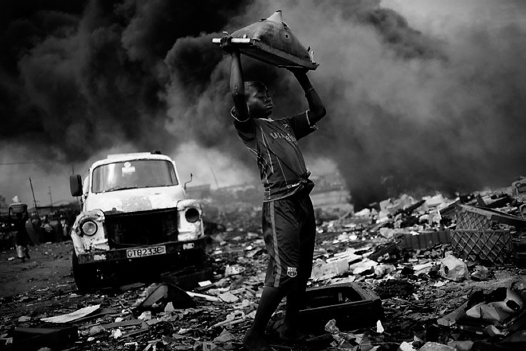
The picture indicates the responsibility that follows from industrial production and consumption patterns in industrialized countries. It illustrates that fact that, ← 30 | 31 → in the context of economic globalization under the terms of neoliberal guidelines, poverty issues and discrepancies between income and opportunities have intensified throughout the world. Likewise, the globalization of the ‘risks to civilization’ has long since become a threat to the life of all human beings: cultural globalization is associated with conflicts which, for the time being, have not been successfully mitigated by applying global ethics which are tied to a collective commitment (cf. Steffens / White 2004, 16).
Given the complexity of the structures, disruptions and conflicts involved with globalization, however, there is no unified picture against which educational science might be able to develop an identity or find its direction. The dominance of the processes of globalization across all areas of life means that we need to address the question of how a social science should react to these open-ended and indeed largely contradictory processes. The role of science is to get to the bottom of complex relationships and, in the particular case of educational science, to open them up for practical use. We thus come closer to the question of what might be meant by educational science’s search for a global identity.
Trends in developing a global identity for education
The term “identity” generally refers to the instance of complete conformity between two objects or situations, or to a phenomenon which remains completely unchanged despite the passing of time and the changing circumstances of the situation”. (Brunner / Zeltner, 1980, 100). If we apply this definition to the problem at hand, the question of the identity of education in the process of globalization would firstly be: to what extent do globalization processes and the actions of educational science coincide, and do they pursue a common aim, for example, cosmopolitanism? The second part of the definition of “identity” given above does, however, allow us to ask: what might be a constant function of educational science that it retains despite the changes brought about by globalization and regardless of time and space? By viewing the matter from this perspective, the search for an identity for educational science would be guided more towards the question of a general essence of incarnation and the destiny of humankind, which remain valid irrespective of any cultural and social processes. Here, we need to ask what we mean when we speak of “general education” (in German: “Allgemeine Bildung”) for all people regardless of their background.
The concept of identity is often used within the context of a person’s psychological development. In psychology, individual identity is described as the “uniqueness of an individual, which is retained despite experiencing different ← 31 | 32 → situations throughout the course of life” and can also “be described as the sum of features and combinations of features that will always make an individual different from others (Brunner / Zeltner, 1980, 160 et seq.). If someone is searching for their identity, they are trying to find a genuine position in their social context. An identity develops and is asserted” against the pressure to adapt to social norms and whilst being overwhelmed by needs which press for gratification (Krappmann 1995, 434). If educational science (as a whole) is to set about the search for a global identity, the initial step must be to develop an “internal model” of itself, and not to adapt to social or possibly economic standards arising as a result of the globalization process. Although the process of creating an identity is always driven by the hope of being able bring it to its conclusion, the process remains eternally incomplete, both for the individual and for science. Just like a person, a social science will be continuously confronted with new situations which lack consistency and are partly contradictory, and it will be driven by expectations which are not fully understood and force them to reposition themselves.
Globalization brings with it a variety of exciting, often conflicting demands for the educational sciences; these demands must be clarified on the basis of this science’s self-conception and integrated into the process of finding an identity. Tensions which are created by globalization and pose a particular challenge for educational science’s search for an identity – and for our conference - were outlined in the UNESCO Report on Education for the 21st Century. It describes a total of seven areas of conflict that need to be addressed by education and the educational sciences: the tension between the ‘global’ and the ‘local’, the tension between the ‘universal’ and the ‘individual’, the tension between ‘tradition’ and ‘modernity’, the tension between long-term and short-term considerations, the tension between the need for competition and concern for equality of opportunity, the tension between the extraordinary expansion of knowledge and human beings’ capacity to assimilate this knowledge and the tension between the spiritual and the material (cf. German Commission for UNESCO, 1997, 14 et seq.). The task of developing an identity proves extremely difficult in these areas of conflict. In almost all fields of practice, there is a wide range of challenges emerging for education within the conflict-ridden area of globalization. The phenomena of globalization are already represented in many areas within educational science. Three trends can be observed here:
- The conditions in which human beings develop is changed and defined by the increasing level of globalization throughout the world of learning subjects, calling for a new discourse in educational theory.
- There is an increasing level of globalization in education, which manifests itself in the global spread of schooling (a developmental obligation to offer ← 32 | 33 → formal education has been introduced in state education systems in all of the countries throughout the world) and the way in which education is being brought in line with universal standards through global educational monitoring (e.g. through World Education Reports, Pisa studies, etc.).
- Globalization is occurring within education, as can be seen in the growing level of deregulation in the provision of state education and its submission to market mechanisms. Another thing that must be taken into account here is the fact the the education market itself is being increasingly viewed as a service sector which has potential for growth (e.g. by offering the option of private schools and universities or by providing services on what is known as the further education market).
In the light of this trend, we must ask how educational science can position itself given the changed circumstances. There would appear to be three possible directions that the search for a global identity for educational science might take:
- The process could be pushed forward by educational science and practice according to neoliberal guidelines in the interests of economic globalization.
- Negative developments could be counteracted by the development and implementation of humane, socially just and ecologically sustainable principles, structures and practices with the support of educational science.
- Educational science and practice could be playthings in what would appear to be an inevitable progression in the liberalization of the global market.
Efforts to prepare people and curricula for global economic competition and to submit to the educational systems of neoliberal market mechanisms are currently the dominating force in national education debates on the issue of globalization. Reforms are enforced and education is adapted, as far as possible, in line with both real and speculative market expectations by appealing to international competition (cf. Steffens/Weiß 2004, 26). Here, it seems that the processes are being controlled by a kind of anonymous power and have been largely stripped of political structure. In this regard, Bourdieu says that the “social sciences are doomed either to abide by the unashamed wishes of companies or state bureaucracies or to perish by the censorship imposed by power and money.” (Bourdieu 1998, 47). To explain this phenomenon, Koneffke states that globalization is actually a logical further development in the expansive nature of civil societies and their economies, which educational measures have had to follow since they first began. Globalisation and pedagogy therefore both have a common historical origin. They are however ultimately contradictory: According to Koneffke, the impetus of globalization has a desire for humankind to submit to its law of motion; on the ← 33 | 34 → other hand, education is geared towards ensuring that an educated, self-conscious humankind will define its own order (cf. Koneffke 2004, 241).
The question of the role of educational science in the globalization process is implicit in the subject of this conference, which is intended to call for a more detailed definition of the specific tasks with which educational science is faced in this changing situation, as well as to distinguish its self-image. Following from the discussion, however, we must not rule out the possibility of questioning the subject of the conference itself. By this I am referring to the question of whether educational science should develop a global identity at all or perhaps whether it might not also be capable of turning away from the demands imposed by globalization. In any case, it is important that we clarify the extent to which an identity that associates educational science with globalization in the objectives is possible and useful. Perhaps there is a question mark missing from the subject matter of this conference: does educational science actually need to search for a global identity, or can and should it turn away from the processes of globalization to a certain extent? On the other hand, one might also ask to what extent educational science is actually free to search for its own identity. Is it not the case that the conditions created as a result of globalization are so stringent that an independent search for an identity for educational science appears almost impossible?
The most important task for the global community will be the recovery of the political in the globalization process. In attempting to find a global identity for educational science, our aim at this conference is to analyse the difficulties involved in overcoming the tensions presented, to identify ways of achieving a balance between the individual poles and to develop suggestions as to how human beings can learn to contribute towards shaping peaceful, ecological and interdependent development on a global level.
References
Altvater, Elmar; Mahnkopf, Birgit (1996): Grenzen der Globalisierung. Ökonomie, Ökologie und Politik in der Weltgesellschaft. Münster.
Baumann, Zygmund (2000): Die Krise der Politik. Fluch und Chance einer neuen Öffentlichkeit. Hamburg.
Beck, Ulrich (1997): Was ist Globalisierung? Irrtümer des Globalismus - Antworten auf Globalisierung. 3. Aufl. Frankfurt am Main.
Details
- Pages
- 730
- Publication Year
- 2015
- ISBN (PDF)
- 9783653048360
- ISBN (MOBI)
- 9783653978216
- ISBN (ePUB)
- 9783653978223
- ISBN (Hardcover)
- 9783631656105
- DOI
- 10.3726/978-3-653-04836-0
- Language
- German
- Publication date
- 2014 (October)
- Keywords
- Globalisierung Lehrerausbildung globalisierte Identität Nationalität
- Published
- Frankfurt am Main, Berlin, Bern, Bruxelles, New York, Oxford, Wien, 2014. 730 S., 62 s/w Abb., 73 Tab.
- Product Safety
- Peter Lang Group AG

